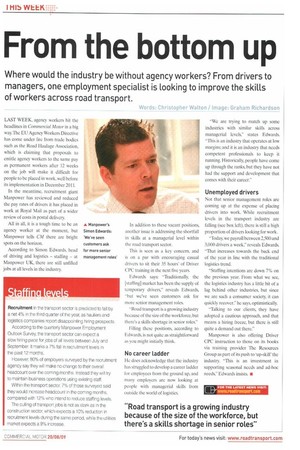From the bottom up
Page 16

If you've noticed an error in this article please click here to report it so we can fix it.
Where would the industry be without agency workers? From drivers to managers, one employment specialist is looking to improve the skills of workers across road transport.
Words: Christopher Walton / Image: Graham Richardson
LAST WEEK, agency workers hit the headlines in Commercial Motor in a big way. The EU Agency Workers Directive has come under fire from trade bodies such as the Road Haulage Association, which is claiming that proposals to entitle agency workers to the same pay as permanent workers after 12 weeks on the job will make it difficult for people to be placed in work, well before its implementation in December 2011.
In the meantime, recruitment giant Manpower has reviewed and reduced the pay rates of drivers it has placed in work at Royal Mail as part of a wider review of costs in postal delivery.
All in all, it is a tough time to be an agency worker at the moment, but Manpower tells CM there are bright spots on the horizon.
According to Simon Edwards, head of driving and logistics — staffing — at Manpower UK, there are still unfilled jobs at all levels in the industry In addition to these vacant positions, another issue is addressing the shortfall in skills at a managerial level within the road transport sector.
This is seen as a key concern. and is on a par with encouraging casual drivers to sit their 35 hours' of Driver CPC training in the next five years.
Edwards says: "Traditionally, the [staffing] market has been the supply of temporary drivers," reveals Edwards, "but we've seen customers ask for more senior management roles.
"Road transport is a growing industry because of the size of the workforce, but there's a skills shortage in senior roles."
Filling these positions, according to Edwards, is not quite as straightforward as you might initially think.
No career ladder
He does acknowledge that the industry has struggled to develop a career ladder for employees from the ground up, and many employers arc now looking at people with managerial skills from outside the world of logistics. "We are trying to match up some industries with similar skills across managerial levels," states Edwards. "This is an industry that operates at low margins; and it is an industry that needs competent professionals to keep it running. Historically, people have come up through the ranks, hut they have not had the support and development that comes with their career.
Unemployed drivers
Not that senior management roles are coming up at the expense of placing drivers into work. While recruitment levels in the transport industry are falling (see box left), there is still a high proportion of drivers looking for work.
"Today, we payroll between 2,500 and 3,000 drivers a week," reveals Edwards. "That increases towards the back end of the year in line with the traditional logistics trend.
"Staffing intentions are down 7% on the previous year. From what we see, the logistics industry has a little bit of a lag behind other industries, but since we are such a consumer society, it can quickly recover." he says, optimistically.
-Talking to our clients, they have adopted a cautious approach, and that means a hiring freeze, but there is still quite a demand out there."
Manpower is also offering Driver CPC instruction to those on its hooks via training provider The Resources Group as part of its push to `up-skill' the industry. -This is an investment in supporting seasonal needs and ad-hoc needs," Edwards insists. •




































































































































